Effect of Pharmacist Led Educational Interventions on Disease Knowledge and Glycaemic Control in Patients with Diabetes Mellitus in a University Hospital
Javedh Shareef1*, Jennifer Fernandes1, Laxminarayana Samaga2 and Mahalingeshwara Bhat2
1Department of Pharmacy Practice, NGSM Institute of Pharmaceutical Sciences, India
2Department of General Medicine, KS Hegde Medical Academy & Hospital, India
Submission: September 15, 2016; Published: October 14, 2016
*Corresponding author: Javedh Shareef, Assistant professor, Department of Pharmacy practice, NGSM Institute of Pharmaceutical sciences, Paneer, Mangalore, Karnataka, India.
How to cite this article: Javedh S, Jennifer F, Laxminarayana S, Mahalingeshwara B. Effect of Pharmacist Led Educational Interventions on Disease Knowledge and Glycaemic Control in Patients with Diabetes Mellitus in a University Hospital. Curre Res Diabetes & Obes J. 2016; 1(2): 555559. DOI:10.19080/CRDOJ.2016.01.555559
Abstract
Background: Diabetes mellitus is a chronic metabolic disorder that presents high morbidity and mortality with significant reduction in patient’s quality of life. The present study was conducted to evaluate the effect of pharmacist led educational interventions on disease knowledge and glycaemic control in patients with diabetes mellitus.
Methodology: A prospective randomized educational interventional study was carried out in the General Medicine Outpatient department in a South Indian teaching hospital, Mangalore, Dakshina Kannada district for a period of 12 months from October 2014 – September 2015.
Results: A total of 106 patients who met the study criteria were enrolled and randomly divided into usual care and intervention groups. Data were collected by using a validated questionnaire developed by the researcher for overall diabetes knowledge to both the groups at the beginning and at the end of the study. The results showed a significant increase in overall diabetes knowledge from 18.05 to 25.43 (p <0.001) in the intervention group as compared to usual care group (19.78 – 18.07, p =0.007). The mean scores of patient’s knowledge about diabetes, self-care practices and knowledge regarding complications of diabetes mellitus with respect to all the domains in the intervention group showed a significant improvement (p<0.05).A significant decrease (p<0.001) in the fasting and post prandial blood glucose levels was observed in the final follow up from the baseline period in the intervention group.
Conclusion: The study highlights the positive impact of clinical pharmacist led intervention through education programme on improving disease knowledge and clinical outcomes in patient with diabetes mellitus.
Keywords: Diabetes mellitus; Patient education; Knowledge questionnaire; Clinical pharmacist
Introduction
Comprehensive management of diabetes mellitus and its complications is being considered as a biggest challenge for the healthcare team. Diabetes mellitus is a chronic metabolic disorder that results in high morbidity and mortality with huge financial impact on individuals and significant reduction in their quality of life. Uncontrolled blood sugar level is highly influence for the development of macro and micro vascular complications. It is one of the major causes of kidney failure, lower limb amputations, blindness, cardiovascular and cerebro vascular diseases which doubles the risk when compared with general population [1]. Estimation of the global diabetes mellitus prevalence in developing countries predicts 6.4%, affecting 285 million adults in 2010 and will increase to 7.7% and 439 million adults by 2030. According to International Diabetes Federation (IDF) report, India today heads the term largest number with over 41 million diabetic patients in the world and that this would rise to 70 million by the year 2025 in the absence of preventive measures [2].
Knowledge about the disease has been considered as one of the greatest weapon in the fight against diabetes mellitus. Poor awareness and practices and lack of diseases knowledge among patients with diabetes mellitus are some of the important variables influencing the progression of diabetes and its complications, which are largely preventable [3]. Action is needed at all levels of health care and in the various aspects of diabetes care to bridge this gap and to improve healthcare delivery to patients with diabetes mellitus. It is therefore essential to provide comprehensive services including health education regarding the self management of the disease in order to prevent the associated complications which in the long term reduces the enormous financial burden on the health care system4. Helping patients to achieve their best possible level of glycaemic control will require educating the patients about the knowledge of disease, medication adherence, appropriate monitoring and follow up and comprehensive instructions in diabetes management. Educational interventions to promote better self care management have reported improvements in blood glucose control which is highly advantageous in the prevention of diabetes related complications as reported by various studies [2,4,5]. Educating the people about the diseases for self care management has become an important part of the clinical management of diabetes however the process is often complex, demanding and not given much emphasis at professional level because of the time constraints of physicans5. So a clinical pharmacist with excellent and dynamic background on disease states and therapeutic knowledge on diabetes can play an important role in diabetes care by screening patients at high risk for diabetes, assessing patient’s health status, educating patients to empower them to care for themselves and monitoring outcomes.
This study was undertaken with the aim to evaluate the impact of pharmacist led educational interventions on disease knowledge and clinical outcomes in patients with diabetes mellitus in an Indian teaching hospital at Dakshin Kannada district, Mangalore, Karnataka.
Life Style ModificationsMaterials and Methods
It was a prospective, randomized interventional study spanned over 12 months at a multi-speciality tertiary care teaching hospital at Dakshina Kannada district, Mangalore, Karnataka. Ethical committee clearance was obtained from the institutional ethical committee. Patients with uncontrolled blood glucose diagnosed with diabetes mellitus (Type-1 or Type-2) with or without co-morbidities receiving treatment with either oral hypoglycaemic agents or insulin visiting the outpatient general medicine department were included in the study. Pregnant women, mentally challenged patients and critically ill patients were excluded from the study.
Patients who met the study criteria were enrolled in the study after getting the inform consent and were randomly allocated to the intervention group or to the usual care group using simple randomisation method. All the patient details including demographic status were collected and documented in the suitable designed data collection form designed as per need of the study.
Over all diabetes mellitus knowledge questionnaire which was developed by the researcher and validated in consultation with the physicians and other speciality doctors in the field of diabetes mellitus was provided to both the groups at the baseline and their scores were collected and documented. Patients were reminded about their follow up and the glycaemic levels (fasting and post prandial blood glucose levels) of both the groups were recorded during their three consecutive follow ups of four months apart. Patients in the intervention group received pharmaceutical care which included knowledge about the disease, signs and symptoms, instructions on dietary regulation, exercise and other life style modifications while the control group patients did not receive any pharmaceutical care till the end of the study. The patient information leaflet including diabetic diet chart (prepared and validated in three languages: English, Malayalam and Kannada in consultation with the physicians, speciality doctors and chief dietician of the study hospital) were also provided to the intervention group in order to provide better counselling. At the end of the study, questionnaire was repeated to both the groups and the collected scores was statistically analyzed by using chi-square and Fischer’s exact test to assess the effect of pharmacist educational interventions in disease management program in the intervention groups as compared to the usual care group.
Over all diabetes mellitus knowledge questionnaire
For assessing the patients over all diabetes mellitus disease knowledge in our study, an instrument consisting of 30 questions covering the various aspects of diabetes was prepared by the researcher and validated locally in consultation with the physicians and specialist doctors in the field of diabetes mellitus was used. The reliability of the scale was determined by assessing the Cronbach alpha coefficient and was found to be 0.836 for all the 30 questionnaires. This instrument, divided into two parts - demographic status and over all diabetes mellitus knowledge questionnaire. The demographic status includes variables like age, sex, marital status, education, occupation, duration of diabetes mellitus and family history of diabetes mellitus etc. Questions on over all knowledge regarding diabetes mellitus were again divided under four headings - basic knowledge about DM, self care practices, knowledge regarding complications of DM and symptoms of DM and was applied twice to all the study participants in both the groups, at the beginning of the study (before any educational activity) and at the end of the study. All the respondents were assured of confidentiality and anonymity. The time taken by each patient to complete the questionnaire ranged from 10 – 15 minutes. The responses were in the format of Yes, No and don’t know and were scored as 1, 0, 0 points respectively. The maximum score is 30 and the higher score indicates greater knowledge.
Results
A total of 106 patients completed the study, 55 in the intervention group and 51 in the control group. The age range of the participants in both the groups was between 33 to 79 years old. The mean age of the study population in both intervention and control groups was found to be 58.38 ± 10.43 and 55.37 ± 9.88 (Mean ± SD) years respectively. The following (Table 1) show the characteristics of the groups studied in relation to the socio demographic variables.
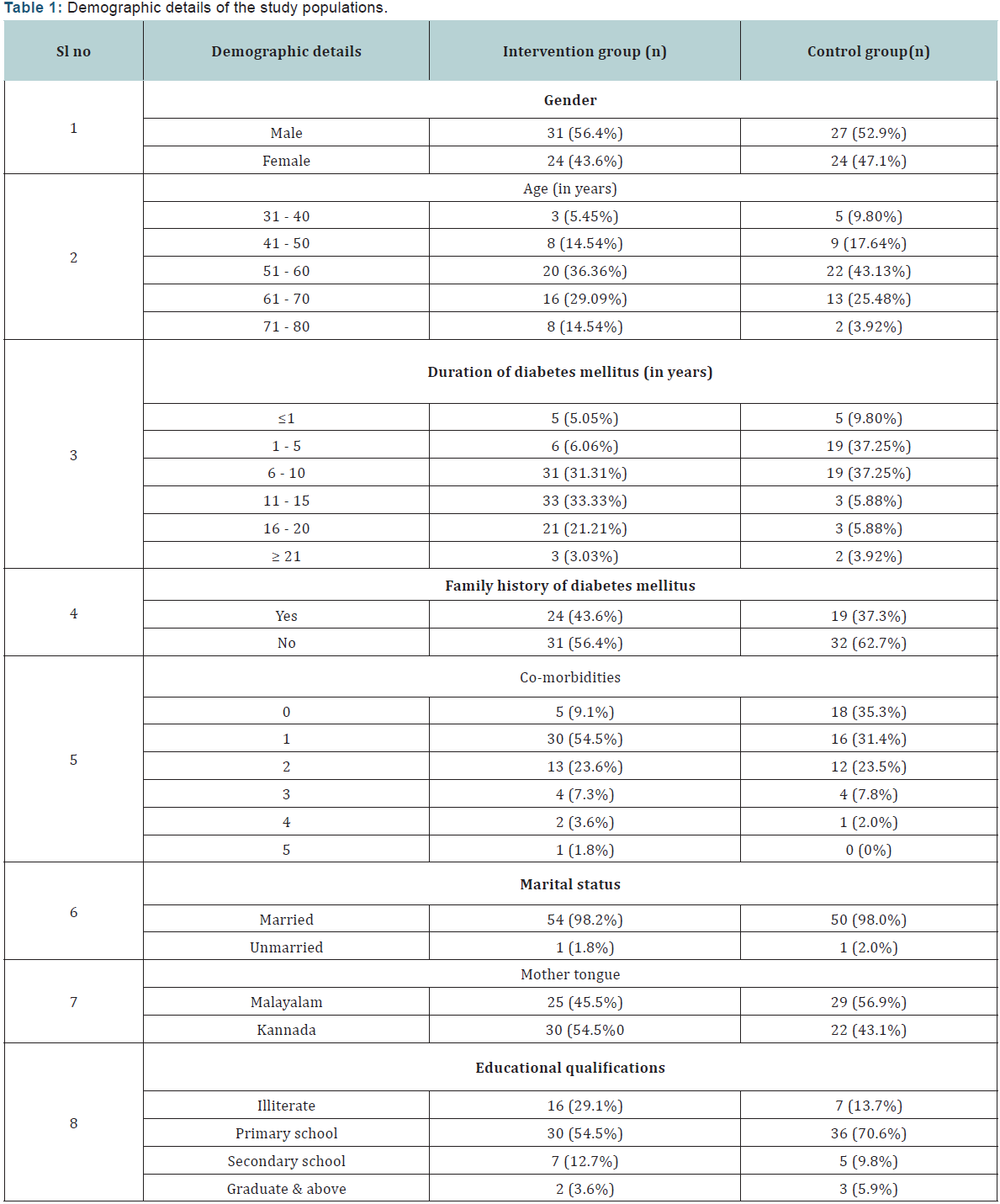
At the beginning of the study, the 30 item questionnaire was categorized into four domains consisting of basic knowledge about diabetes mellitus, self-care practices, knowledge regarding complications of diabetes mellitus and symptoms of diabetes mellitus. All the patients in both the groups completed the questionnaire at their first and during the last visit of their study. These items under each domain were compared between intervention and control at the beginning and end of the study by using chi-square and Fischer’s exact test. Comparing all the 30 questionnaires under each domain between the intervention and control at the beginning and at the end of the study, statistical results showed a significant increased in percentage in most of the items under all the four domains (p<0.05) in the patients of intervention group. In the usual care group, some changes were observed in knowledge and self care about diabetes, these were fewer when compared with the intervention group. The comparison of each domain about diabetes mellitus between intervention and usual care groups at the baseline and final follow up was shown in following (Table 2A-2D).
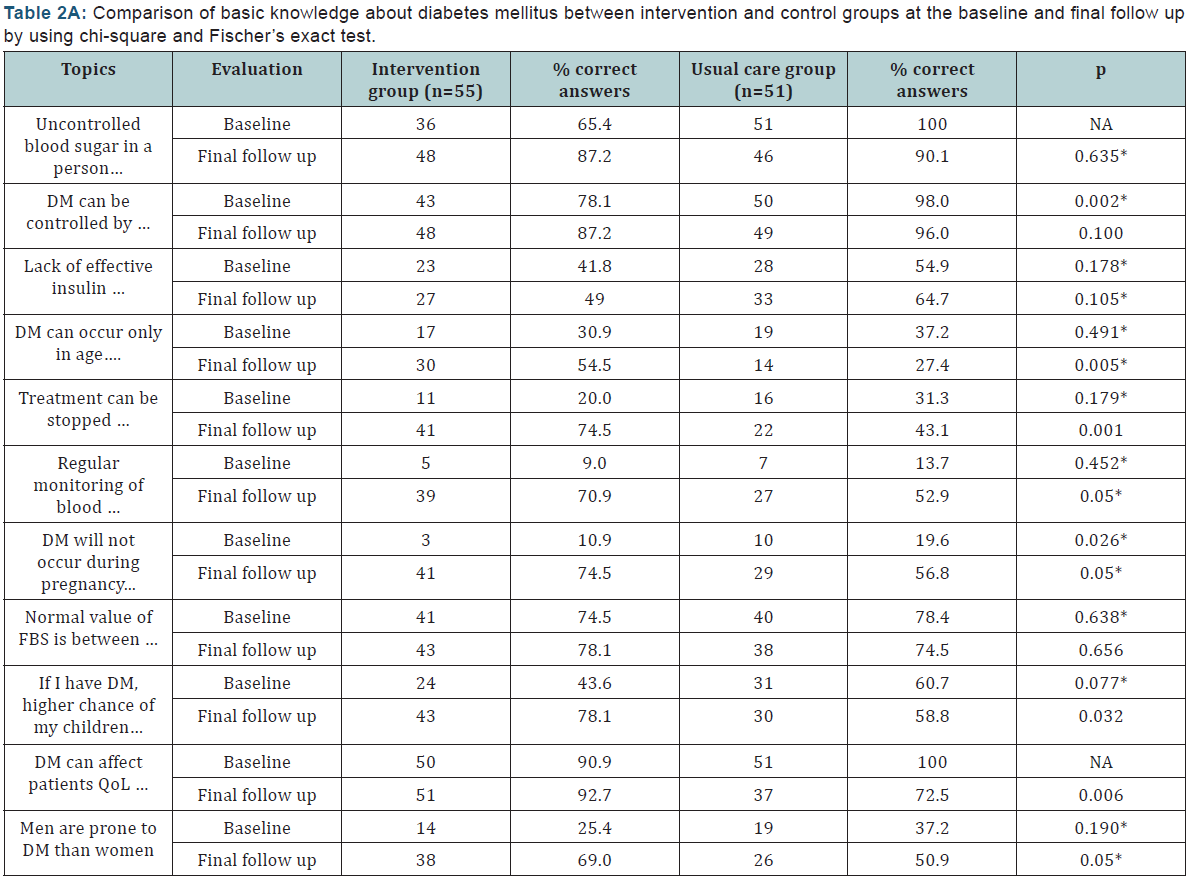
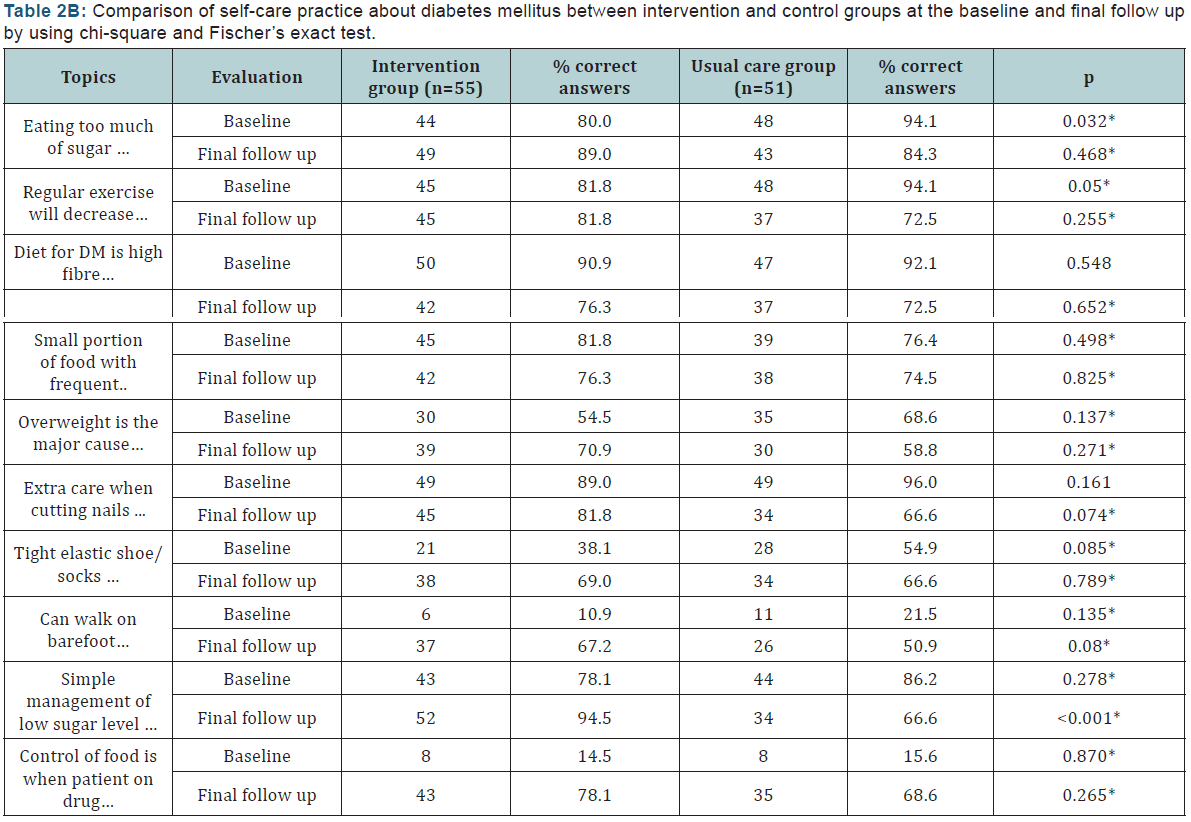
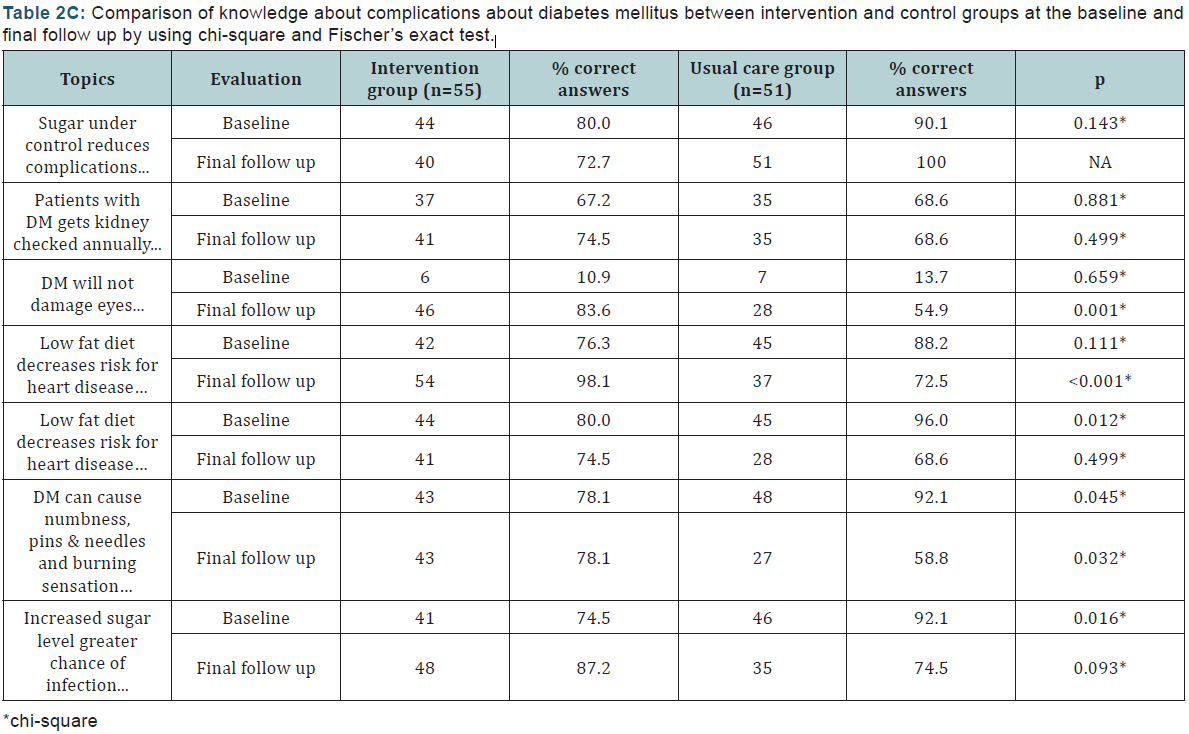


All the four domains were compared between intervention and control groups at their baseline and final visit using chisquare and fisher’s exact. At the end of educational interventions, as can be seen from the (Table 3), it was found that mean scores of patient’s knowledge about diabetes, self-care practices and knowledge regarding complications of diabetes mellitus with respect to all the domains (p< 0.05) in the intervention
The overall diabetes knowledge questionnaire was compared within both the groups by using paired‘t’ test. The average baseline score was 19.78 ±3.92 for the control group and 18.05 ± 5.45 for the intervention group which were not statistically significant (p >0.05). In the final follow up it was found that the group showed a significant improvement except symptoms of diabetes mellitus. Though some changes were also observed in the control group, these were statistically less significant when compared with interventional group. The comparison of overall diabetes knowledge questionnaire by all the domains between intervention and usual care group at the baseline and final follow up is shown in the following (Table 3).
interventional group score 25.43 ±1.37 was found to be more statistically significant when compared to the control group scores 18.07±1.91 from the basal values (p <0.05). Comparison of overall diabetes knowledge questionnaire within groups by using paired‘t’ test was shown in the (Table 4).
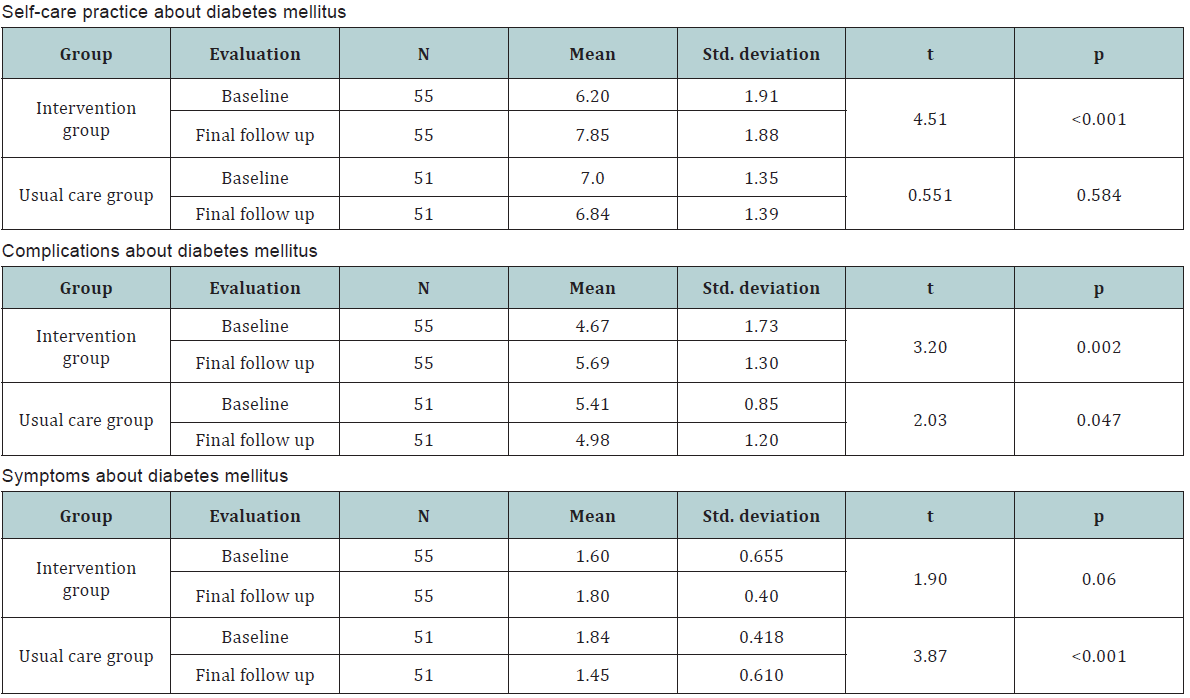

The results of glycaemic control shows that there was a significant reduction in blood glucose levels (both fasting and post prandial) from the baseline to final follow up in the intervention as compared to the usual care group. The fasting blood glucose levels were decreased from 163.45 ± 56.03 mg/ dL to 114.45 ± 18.87 mg/dL and the post prandial from 260.30 ± 93.43 mg/dL to 165.19±33.44 mg/dL in the intervention group. The comparison of the blood glucose levels from the baseline and final follow ups of both the groups has been shown in the following (Figure 1&2).
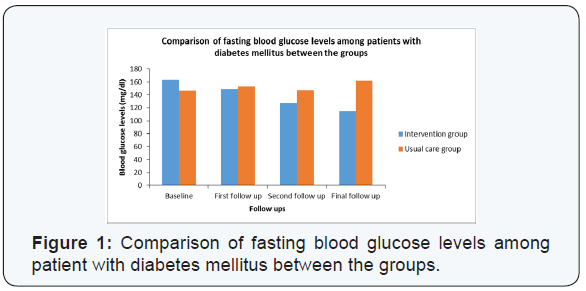

Discussion
For patients with chronic diseases, knowledge about their illness is very important as it plays a vital role in its successful management. Diabetes mellitus is no exception to this. Knowledge helps the patients to assess their risk for diabetes, motivate them to seek proper treatment and care and inspire them to take control of their disease. The study evaluated the effect of educational interventions on disease knowledge in patients with diabetes mellitus, which generated satisfactory results with regards to all the four domains in the overall diabetes knowledge questionnaire. This educational interventions allowed the interventional group participants to improve basic knowledge about the disease, develop self-care measures, adopting healthy habits and practising physical activity which will help in the prevention and control of disease symptoms.
Life style modification and regular physical activity in patients with diabetes mellitus play a vital role in the evaluation of group education programs. The education level can be considered a determinant factor in the effectiveness of an educational program, especially in patients with diabetes mellitus who need to acquire certain knowledge to be able to develop their self care practice [6,7]. A low education level is reported as a factor that can effect adherence to the disease management including the pharmacological treatment, because of the complex anti-diabetic regimens and require comprehension of their use by the patients. Both the groups were found to be similar in education as 30 participants in the intervention group and 36 participants in the control group in our study showed a predominance of primary school education, which enabled the comparison of learning between them. Other studies also found a predominance of this education level in patients with diabetes mellitus [8,9]. The advanced age found in this population did not represent difficulties in learning, a different result that was found in a study that examined the barriers to diabetes education and concluded that older people, among other difficulties also presents limitations in education.
The educational program implemented in this study increased the knowledge of diabetes in the interventions group patients in all the domains. Other studies that have developed group educational programs for patients with diabetes mellitus by using participatory teaching strategies such as role plays, relating to experiences and walking also found similar results [10,11]. A review carried out with 72 studies on type2 diabetes mellitus self management education concluded that educational interventions that involve the collaboration of the patients may be more effective in the disease management programs [12].
Improving the knowledge about the disease and its complication and strengthening the self care practice in relation to the disease, directed toward the person with diabetes and their family through educational health practices enables a person to exist better with their condition and promote the taking of conscious decisions making them self managers of their health. There is evidence that knowledge about the characteristics and complications of diabetes greatly improves the evolution of the disease because it leads to early detection and reduction in rate of occurrence of associated chronic complications [13-15].
In the present study, the interventional group achieved a higher increase of knowledge in the domains: basic knowledge about diabetes, self care practices and knowledge regarding complications of diabetes mellitus. Knowledge about the diabetes mellitus helps in understanding about the disease and its symptoms, importance of blood glucose level, etiological factors, role of diet, exercise and medication in controlling the diseases, life style modifications, prevention of complications and associated co-morbidities etc. Increasing the knowledge of individuals with diabetes mellitus along with the educational material is essential for reinforcing their ability and gaining confidence to develop self care practices which together contribute to better disease management. So implementing an education program tailored to the individual needs in patients with diabetes mellitus along with the support of the family member should be considered as an integral part of the comprehensive diabetes care.
Outcome of glycaemic levels
Statistically significant improvement in blood glucose levels of both fasting and post prandial levels were observed from the baseline and sustained until the end of the study period. This show that that the pharmacist education sessions, follow up calls and appointment with the interventional group proved beneficial in reducing the mean blood glucose levels significantly. The pharmacist delivered continuous follow up and advice for their glycaemic control in the intervention group can develop a trustable close professional relationship between the pharmacist and patients as a part of the educational program might have contributed to a better glycaemic control in this study. These findings are similar to those of other studies conducted in other countries which show that the pharmacist led patient education and medication counselling was effective in improving medication adherence and glycaemic levels in patients with type2 diabetes mellitus [16-19].
Conclusion
Health education consists of activities aimed at facilitating changes in behaviour and adoption of practices that should decrease the risk of disease and illness, thereby reducing morbidity and mortality. Patient education should be considered as an integral part of the successful disease management programme especially in chronic diseases. Improving the knowledge about their illness through structured educational interventions by a clinical pharmacist will helps in improving patient’s life style modifications and adhering to self care practices which is being considered as a very important tool in addition to drug therapy in the management of diabetes mellitus.
References
- Ashok JV, Manasi SP, Gladius HJ, Shekhar BP (2013) A study to assess awareness regarding diabetes mellitus and factors affecting it in a tertiary care hospital in Kancheepuram district. Healthline pISSN 2239-337X337X/eISSN2320-1525 4(2): 44-49.
- Puepet FH, Mijinyawa BB, Akogu, Azara (2007) Knowledge, Attitude and Practice of Patients with Diabetes mellitus before and after educational interventions in Jos, Nigeria. The J Med Tropics 9(1): 3-10.
- Moodley LM, Rambiritch V (2007) An assessment of the level of knowledge about diabetes mellitus among diabetic patients in a primary healthcare setting. South African Family Practice 49(10): 16- 16d.
- Pereira DA, Costa NMSC, Sousa ALL, Jardim PCBV, Zanini CR (2012) The effect of educational interventions on diseases knowledge of diabetes mellitus patients. Rev Latino-Am Enfermagem 20(3): 478-485.
- Khaldon KA, Mohammed HB, Fares HH, Ibrahim IA (2012) Diabetes knowledge among patients with diabetes mellitus at King Hussein hospital. Journal of the Royal Medical Services 19(1): 72-77.
- Nikhil PH, Shivaswamy MS, Sanjay K, Shweta P, Hiremath MB (2012) Knowledge, attitude and behaviour regarding self-care practices among type 2 diabetes mellitus patients residing in an urban area of South India. Internat Multidispl Res J 2(12): 31-35.
- Subish P, Leelavathy DA, Rao Padma GM, Ravi Shankar P, Nidin MN, et al. (2006) Knowledge, Attitude and practice outcomes: evaluating the impact of counselling in hospitalized diabetic patient in India. P&T 31(6): 2-9.
- Otero LM, Zanetti ML, Ogrizio MD (2008) Knowledge of diabetic patients about their disease before and after implementing a diabetes education program. Rev Lat Am Enfermagem 16(2): 231-237.
- Miyar LO (2003) Impact of a health promotion program carried out by nursing among type 2 diabetes patients,within the community. Rev Lat Am Enfermagem 11(6): 713-719.
- Al-Maskari F, El-Sadig M, Al-Kaabi JM, AfandiB, Nagelkerke N, et al. (2013) Knowledge, Attitude and Practices of Diabetic Patients in the United arab Emirates. PLoS One 8(1): e52857.
- Swetha T, Smitha T, Vijay Kumar G (2012) Self care knowledge on diabetes among diabetic patients in Warangal region. International Journal of Life science& Pharma Research 2(2): P16-P21.
- Norris SL, Engelgau MM, Narayan KMV (2001) Effectiveness of selfmanagement training in type 2 diabetes. A systematic review of randomized controlled trials. Diabetes Care 24(3): 561-587.
- Mangaiarkkarasi A, Nitya S, Mehar Ali R, Ramaswamy S (2012) A study to assess the knowledge, Attitude and practice about diabetes among diabetic patients in Pondicherry. RJPBCS 3(4): 1185-1196.
- Prianka M, bhaskar P, Debasis D, Nilanjan S, Rachna M (2010) Perceptions and practices of type 2 diabetics: A cross sectional study in a tertiary care hospital in Kolkata. Int J Diab Dev Ctries 30(3): 143-149.
- Mashige KP, Notshweleka A, Moodley S, Rahmtoola FH, Sayed SB, et al. (2008) An assessment of the level of diabetic patients knowledge of diabetes mellitus, its complications and management in Durban, South Africa. African Vision and Eye Health; South African Optometrist 67(3): 95-105.
- Rhee MK, Slocum W, Ziemer DC, Culler SD, Cook CB, et al. (2005) Patient adherence improves glycemic control. Diabetes Educ 31(2): 240-250.
- Al-Qazaz HK, Sulaiman SA, Hassali MA, Shafie AA, Sundram S, et al. (2011) Diabetes knowledge, medication adherence and glycemic control among patients with type 2 diabetes. Int J Clin Pharmacol. 33(6): 1028-1035.
- Mayberry LS, Osborn CY (2012) Family support, medication adherence, and glycemic control among adults with type 2 diabetes. Diabetes Care 35(6): 1239-1245.
- Rausch JR, Hood KK, Delamater A, Shroff Pendley J, Rohan JM, et al. (2012) Changes in treatment adherence and glycemic control during the transition to adolescence in type 1 diabetes. Diabetes Care 35(6): 1219-1224.






























